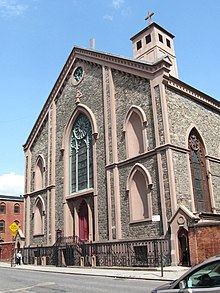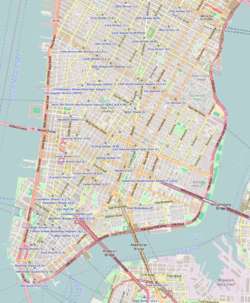St. Patrick's Old Cathedral, New York
| St. Patrick's Old Cathedral | |
|---|---|

Mulberry Street facade
|
|
| Location | Mulberry Street, Manhattan, New York City |
| Country | United States |
| Denomination | Roman Catholic |
| Tradition | Latin Rite |
| Website | St |
| History | |
| Dedication | May 14, 1815 |
| Architecture | |
| Status | Basilica, former cathedral |
| Architect(s) | Joseph-François Mangin |
| Style | Gothic Revival |
| Groundbreaking | 1809 |
| Completed | 1815 |
| Administration | |
| Archdiocese | Archdiocese of New York |
|
Old St. Patrick's Cathedral Complex
|
|
|
Location in New York City
|
|
| Coordinates | 40°43′25″N 73°59′44″W / 40.72361°N 73.99556°WCoordinates: 40°43′25″N 73°59′44″W / 40.72361°N 73.99556°W |
| Area | 1.8 acres (0.73 ha) |
| NRHP Reference # | 77000964 |
| Significant dates | |
| Added to NRHP | August 29, 1977 |
| Designated NYCL | June 21, 1966 |
The Basilica of Saint Patrick's Old Cathedral, or Old St. Patrick's, is located at 260–264 Mulberry Street between Prince and Houston Streets in the Nolita neighborhood of Manhattan, New York City, with the primary entrance currently located on Mott Street. Built between 1809 and 1815, and designed by Joseph-François Mangin in the Gothic Revival style, it was the seat of the Roman Catholic Archdiocese of New York until the current Saint Patrick's Cathedral opened in 1879. Liturgies are celebrated in English, Spanish, and Chinese.
The church was designated a New York City landmark in 1966, and the cathedral complex was added to the National Register of Historic Places in 1977. It was declared a minor basilica by Pope Benedict XVI on March 17, 2010.
The first Roman Catholic church in New York City was St. Peter's on Barclay Street, the cornerstone of which was laid in 1785. By the early 19th Century, the Jesuit rector of that church, Anthony Kohlmann, realized that the city's growing Catholic population needed both a second sanctuary and a cathedral for the first bishop, since the city had been made a see in 1808. The site he selected for the new church was being used as a cemetery for St. Peter's, and was well outside the settled area of the city, surrounded by farmland and the country houses of the rich. The architect chosen was Joseph-Francois Mangin, who had co-designed New York's City Hall with John McComb, Jr. construction on which was ongoing when the cornerstone of St. Patrick's was laid on June 8, 1809. Construction took just under five years, with the sanctuary being dedicated on May 14, 1815. In that same year, John Connolly, an Irish Dominican friar, arrived to take office as the city's first resident bishop. The church, which was the largest in the city at the time it was built, measures 120 by 80 feet and the inner vault is 85 feet high.
...
Wikipedia



